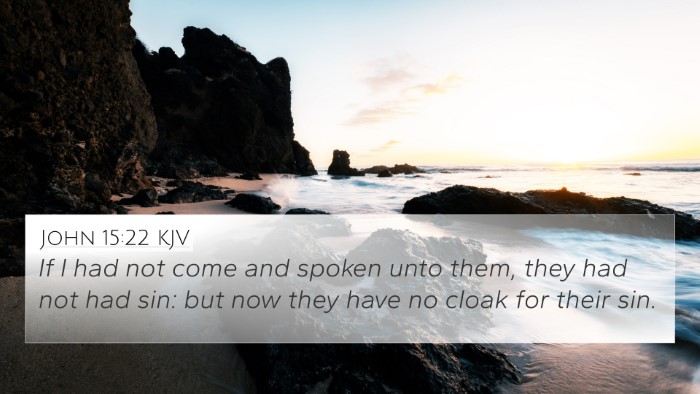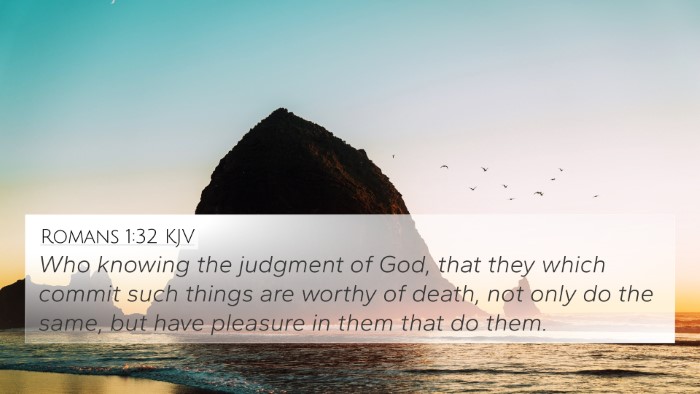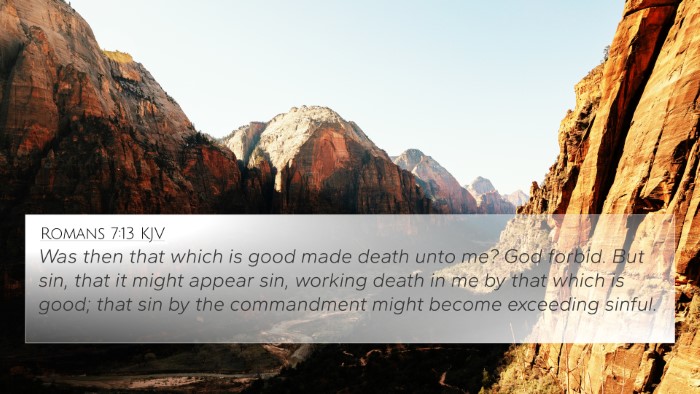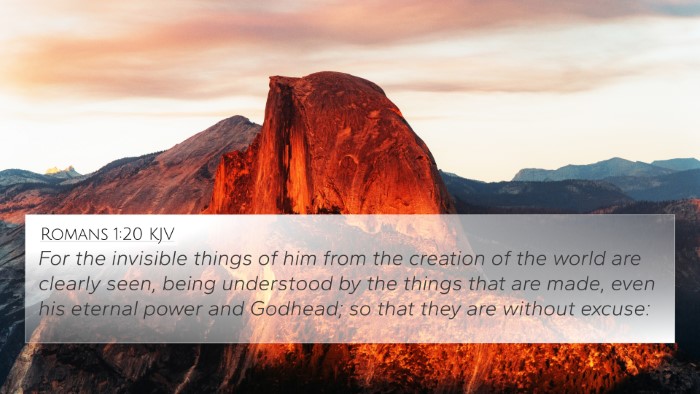Old Testament
Genesis Exodus Leviticus Numbers Deuteronomy Joshua Judges Ruth 1 Samuel 2 Samuel 1 Kings 2 Kings 1 Chronicles 2 Chronicles Ezra Nehemiah Esther Job Psalms Proverbs Ecclesiastes Song of Solomon Isaiah Jeremiah Lamentations Ezekiel Daniel Hosea Joel Amos Obadiah Jonah Micah Nahum Habakkuk Zephaniah Haggai Zechariah MalachiJames 4:17 Similar Verses
James 4:17 Cross References
Therefore to him that knoweth to do good, and doeth it not, to him it is sin.
Uncover the Rich Themes and Topics of This Bible Verse
Listed below are the Bible themes associated with James 4:17. We invite you to explore each theme to gain deeper insights into the Scriptures.
James 4:17 Cross Reference Verses
This section features a detailed cross-reference designed to enrich your understanding of the Scriptures. Below, you will find carefully selected verses that echo the themes and teachings related to James 4:17 KJV. Click on any image to explore detailed analyses of related Bible verses and uncover deeper theological insights.

John 9:41 (KJV) »
Jesus said unto them, If ye were blind, ye should have no sin: but now ye say, We see; therefore your sin remaineth.

John 15:22 (KJV) »
If I had not come and spoken unto them, they had not had sin: but now they have no cloak for their sin.

2 Peter 2:21 (KJV) »
For it had been better for them not to have known the way of righteousness, than, after they have known it, to turn from the holy commandment delivered unto them.

Luke 12:47 (KJV) »
And that servant, which knew his lord's will, and prepared not himself, neither did according to his will, shall be beaten with many stripes.

Romans 1:32 (KJV) »
Who knowing the judgment of God, that they which commit such things are worthy of death, not only do the same, but have pleasure in them that do them.

Romans 2:17 (KJV) »
Behold, thou art called a Jew, and restest in the law, and makest thy boast of God,

Romans 7:13 (KJV) »
Was then that which is good made death unto me? God forbid. But sin, that it might appear sin, working death in me by that which is good; that sin by the commandment might become exceeding sinful.

Romans 1:20 (KJV) »
For the invisible things of him from the creation of the world are clearly seen, being understood by the things that are made, even his eternal power and Godhead; so that they are without excuse:
James 4:17 Verse Analysis and Similar Verses
Understanding James 4:17
James 4:17 states: "Therefore to him that knoweth to do good, and doeth it not, to him it is sin."
Overview of the Verse
This verse succinctly captures the concept of personal responsibility and moral obligation. It emphasizes that knowledge of what is good entails a duty to act accordingly. Failure to do so is classified as sin.
Commentary Insights
- Matthew Henry: Henry asserts that the essence of sin is not merely the action taken but also the omission of good. He points out that knowing what is right without following through on that knowledge leads to a grievous fault.
- Albert Barnes: Barnes emphasizes the importance of knowledge in moral accountability. He argues that the more one understands the moral law of God, the more obligated one is to adhere to it. Ignoring this knowledge is a deliberate act against one's conscience.
- Adam Clarke: Clarke notes that this verse highlights the principle of agency in a believer’s life. To possess the understanding of good implies an active role in righteousness. Thus, failing to act when one knows to do good leads to guilt and separation from God.
Bible Cross-References
For a deeper understanding of James 4:17, it is important to consider related scriptures that explore similar themes of moral responsibility and the knowledge of good and evil:
- Romans 2:14-15: Highlights how even Gentiles, who do not have the law, show the work of the law written in their hearts.
- Luke 12:47: Discusses the servant who knew his master's will yet did not prepare himself, receiving a greater punishment.
- John 9:41: Jesus states that if they were blind, they would have no sin; but since they say they see, their sin remains.
- Proverbs 24:12: Discusses responsibility for knowledge and warns against ignoring one's obligations.
- Matthew 11:21: Jesus rebukes Chorazin and Bethsaida, stressing that knowing better places one under greater obligation.
- 1 John 3:17: Emphasizes the responsibility to help those in need, indicating that withholding good constitutes sin.
- Galatians 6:10: Encourages doing good to all, especially to believers, affirming the need for action aligned with knowledge of good.
- James 1:22: Calls believers to be doers of the word, not merely hearers, reinforcing the call to action based on knowledge.
- Hebrews 10:26: Warns of the danger of willfully sinning after receiving the knowledge of the truth, indicating a severe consequence for inaction.
- Luke 16:10: Illustrates the principle that faithfulness in little things leads to faithfulness in greater responsibilities.
Thematic Connections
James 4:17 connects with broad themes of:
- Responsibility: Knowing what is good requires action.
- Knowledge and Accountability: Greater knowledge brings greater responsibility.
- Simplicit of Sin: Not acting on good when you know is viewed as sinful.
- Conscience: The guiding inner voice that compels believers to act according to their understanding of good.
Tools for Bible Cross-Referencing
For those studying scripture and seeking to understand background connections and relationships, utilize:
- Bible Concordance: A reference tool that lists words found in the Bible and their occurrences.
- Bible Cross-Reference Guide: Provides a compiled list of related scriptures to enhance study.
- Bible Reference Resources: Include commentaries and study Bibles which elaborate on verse meanings.
- Cross-Referencing Bible Study Methods: Incorporate various methods such as thematic study and verse mapping.
Conclusion
James 4:17 serves as a powerful reminder of the ethical obligations arising from awareness of good. By understanding the weight of our knowledge, we can better navigate our moral responsibilities and foster a closer relationship with God. Cross-referencing this verse with others enhances our understanding and aids in a more profound interpretive study of the Scriptures.



